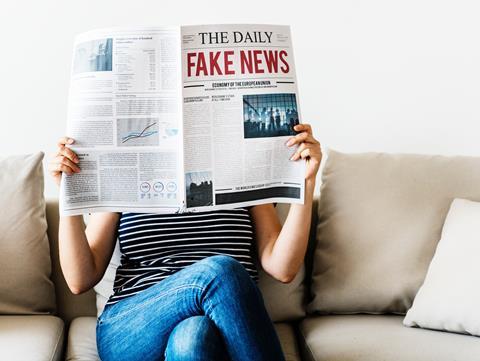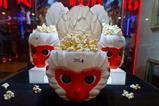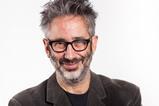In a world where misinformation and fake news abound, how can followers of Jesus properly discern truth?

“It’s a dangerous business, Frodo, going out your door. You step onto the road, and if you don’t keep your feet, there’s no knowing where you might be swept off to.”
Had the internet existed when J.R.R Tolkien’s The Lord of the Rings was written, Bilbo Baggins might have given a similar warning about opening a web browser.
Ideas fly around the world in less than a second these days, and many are seductive. Jesus told us to know the Truth, in order that we might be free. He was referring to himself when he said it, but I guess most of us would agree with St. Augustine that: “all truth is God’s truth”.
Perhaps we should be concerned, then, that objective truths have become harder to discern than ever before. This became especially evident during the height of the Covid pandemic; alternative narratives blossomed in many corners of the internet – but particularly on social media platforms.
Are we conservative, liberal, woke or anti-vax before we’re Jesus’ disciple?
Many are captivated by the theories put forward by QAnon, or embrace beliefs in a flat earth or faked moon landings. Russian state media channels like Sputnik and Russia Today (banned in the UK) present a version of the truth which serves the agenda of the Russian government. Even within the Church, some members of the King James Version-only community base their core ideas on a historical narrative which remains unproven.
Thankfully, we live in a society where free discussion and debate still thrive, but dishonesty and disinformation can muddy the waters and corrode clean, precise conversation. What we lack in clarity we tend to make up for in passion - people back their own side with absolute certainty – leading to an increasingly polarised society. For that reason, calm self-reflection is more important than ever.
Here are five thoughts to help us acid test our beliefs and navigate hot topics with clarity and kindness:
1. How open minded am I?
To paraphrase American thinker Nicholas Butler: a real expert is someone who knows how much they don’t know.
If you’re tempted to close your mind and cling to one conclusion on some subject or other, you may be missing an important piece of a larger puzzle. The ability to question oneself is rooted in humility, and is helpful in staying balanced on the tightrope of objective truth.
2. What standard of evidence do I accept when establishing my beliefs?
The Covid pandemic revealed something interesting about the way we form ideas. Many of us believed mainstream news sources, but those who didn’t often shared TikTok videos, tweets and blog posts to support a particular point.
Two questions arise from this. Firstly, what makes a mainstream news source trustworthy? Secondly, what makes an unverified TikTok video more trustworthy?
Many Covid deniers shared supposed scientific documents or statistics to ‘prove’ their conclusion and promote their ideas. I would sometimes ask those people if they had the required training to interpret the data that they were sharing, and no one ever said yes. That made two of us! But it begs questions: What standard of evidence do we need to see before we draw a strong conclusion? Have we properly scrutinised our evidence before throwing our weight behind an idea?
3. Is my theology shaping my theory or is it the other way around?
There seems to be a habit among some Christians of adopting a political, scientific or ethical view and then cherry picking Bible verses to support it. We ought to be wary of this, and should consistently ask if our theology is shaping our worldview, or if our worldview is shaping our theology.
Is God’s word shaping our understanding of the world; or are we revising his word and ignoring the parts which don’t serve our own ideas?
4. Is my theory helping me to love others and bring unity?
Today’s world can sometimes feel very fragmented. I have friends with ideas that I don’t agree with - from Trump supporters to flat earthers, Covid deniers to Russia apologists.
I’m not necessarily equating all of these views, nor am I dismissing the people that hold them, but it seems easy to draw battle lines and harder to create unity.
On the one hand, people are derided for holding a fringe view. On the other, people are written off as ‘sheep’. Are we acting like Peter did when he cut the ear off the high priest’s servant, attacking our perceived enemy and misunderstanding the type of kingdom that Jesus called us to build?
There are certainly times when we need to stand up for the truth, but we should remember that honest conversations flourish in safe relationships. We should tread with care, lest we push an opinion as fact or speak the truth but alienate those who need to hear it.
5. Is my theory distracting me from Jesus?
Many of us hold our ideas and theories so tightly that they can get in the way of our relationship with God. If we do an honest stock take, do our ideas bring us closer to Jesus, or distract us from him?
Are we conservative, liberal, woke or anti-vax before we’re Jesus’ disciple?
Courage to pursue
In a world of bots, fake news and alternative media, it’s increasingly important to sift our beliefs with care. Half-truths and murky suggestions lie around every corner, and this confusion isn’t authored by God but Satan, the father of lies.
Is God’s word shaping our understanding or are we revising his word and ignoring the parts which don’t serve our own ideas?
Romans 12:3 and 1 Thessalonians 5:21 call us to reflect carefully upon ourselves and our conclusions, and to do so with sober judgement. We should be ruthless in rooting out the bad and holding onto the good. To do this takes courage, honesty and humility.
We’ll have to let the mask slip, and admit the many ways in which we’re more ignorant than we’d like to be. But he gives grace to the humble, and his love is beyond compare.
As we labour to align ourselves with reality - flawed and faltering as we are - we grow in closer union with him who is the very embodiment of Truth itself.




































